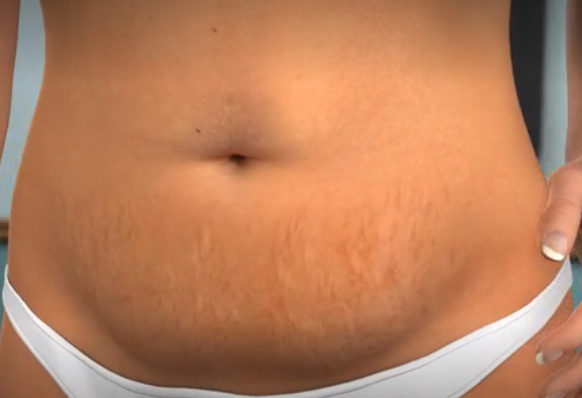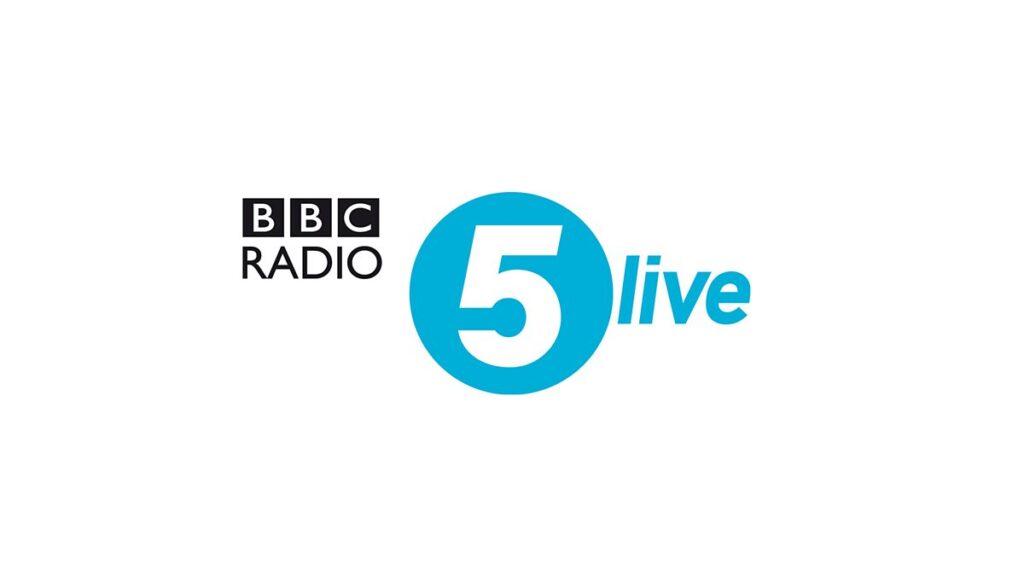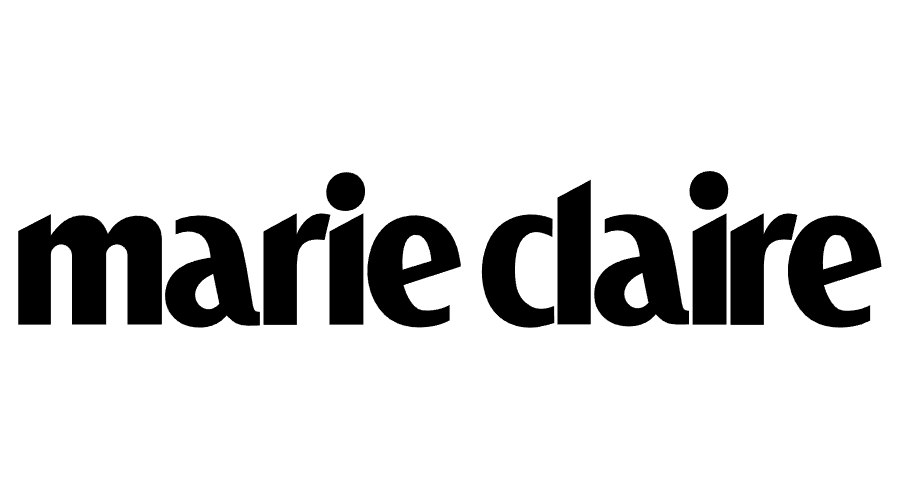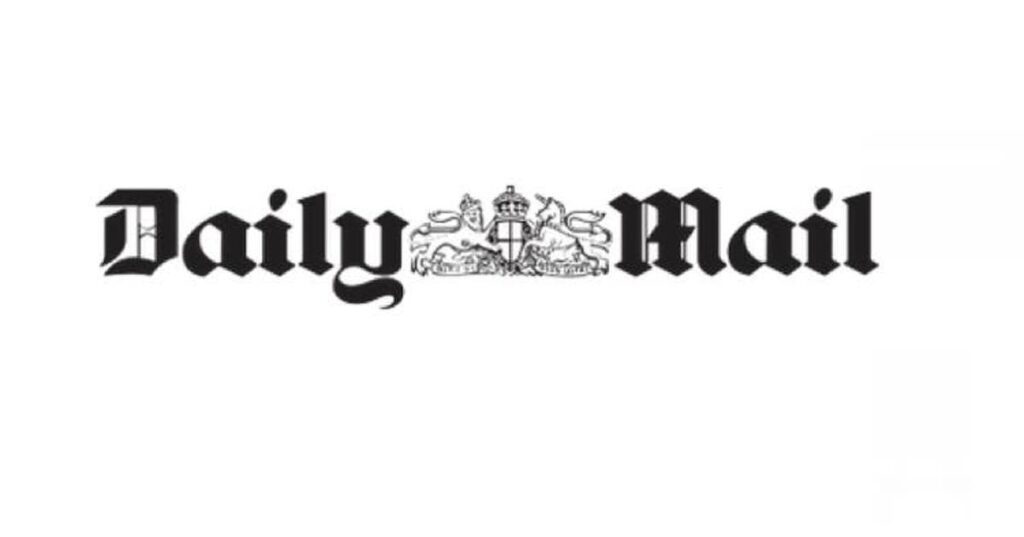What Is A Full Abdominoplasty?
Abdominoplasty, also called a ‘tummy tuck’, is an operation designed to rejuvenate the abdominal area and remove excess fat and skin. It is often performed for patients who have either lost a lot of weight or to remove the excess loose tissue following childbirth. In most cases it restores weakened or separated muscles creating an improved abdominal contour. Gary Ross is one of the most experienced abdominoplasty surgeons in Manchester.
Who Is A Tummy Tuck Suitable For?
Tummy tucks are suitable for people with a stable body weight who have developed excess skin and/ or fat. The common reasons a patient may want an abdominoplasty are pregnancy, drastic weight loss, ageing, genetics or due to a prior surgery.
Who Is A Tummy Tuck Not Suitable For?
Those who have been encouraged to improve their body contour by others. Abdominoplasty surgery is not recommended to people with unrealistic expectations, people who smoke and also those with a significant medical history. If you plan to have more children, you should consider the pros and cons of an abdominoplasty. A consultation with Mr Ross can help to explain the procedure, and when is best to schedule the surgery.
How Much Does An Abdominoplasty in Manchester Cost?
The cost of an abdominoplasty varies on a number of factors. During the consultation with our tummy tuck surgeon Gary Ross, you will be given a quote for surgery. This will include the surgeons, hospitals and anaesthetic fee and will include all the benefits of the BMI’s options package.
What To Expect During Your Abdominoplasty Consultation in Manchester
The success of the abdominoplasty consultation in Manchester depends on your openness and honesty in relation to your health and expectations of surgery. You will be asked questions about your diet, lifestyle, desires. Different surgeries can be tailored to your needs and the potential outcomes, risks and abdominoplasty complications will be discussed.
The tummy tuck surgery removes excess tissue from the abdominal area for an improved figure and the type of abdominoplasty required is tailored to the individual. Various types of full abdominoplasty procedures are available in Manchester, including a mini tummy tuck, reverse tummy tuck, and can be combined with liposuction. The specific tummy tuck procedure could involve lifting the abdominal skin, repositioning the navel and tightening the patient’s abdominal muscles. Patients who have had a significant change in weight may require other procedures to achieve their desired shape. A consultation with Gary Ross, an abdominoplasty surgeon in Manchester regarding the risks and limitations of surgery will help you to choose a procedure that will meet with your expectations.
Preparing For Tummy Tuck Surgery
The majority of abdominal rejuvenation procedures require general anaesthetic. Your health is of prime importance and any cosmetic surgery, including your abdominoplasty, should be postponed if you are unwell for any reason. It is important that if anything changes with your health that you make contact with us.
You should stop smoking 6 weeks prior to surgery and stop taking aspirin, anti-inflammatory drugs and herbal supplements before surgery. You may need preoperative tests prior to abdominoplasty surgery in Manchester, which we will arrange if required. You will generally experience abdominal discomfort following the tummy tuck surgery and should aim to take time from work for at least 2 weeks depending on the type of career you have. Your tummy tuck surgeon will be able to advise on this based on your personal circumstances.
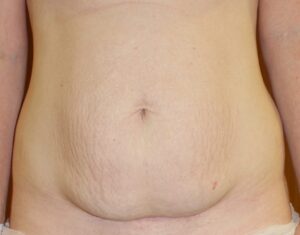
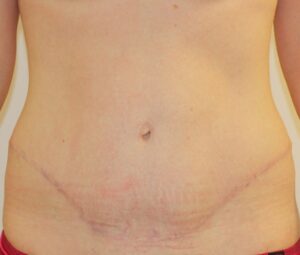
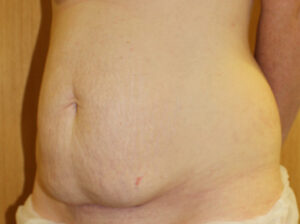
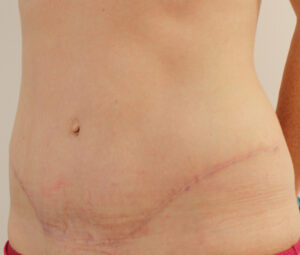
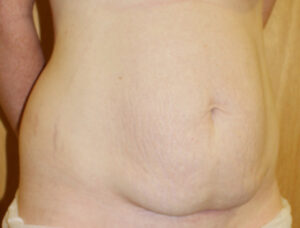
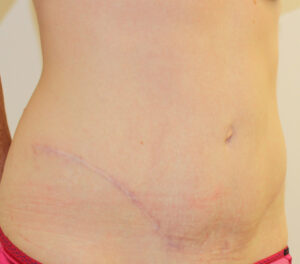
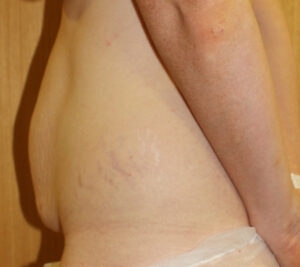
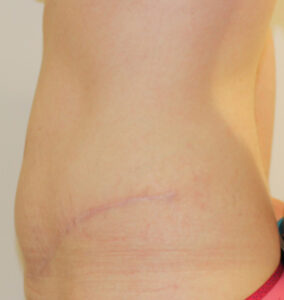
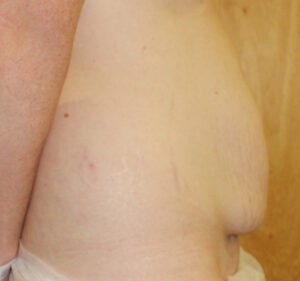
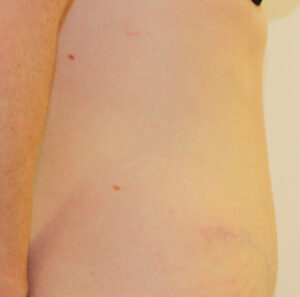
What To Expect During Abdominoplasty Surgery in Manchester
Having an abdominoplasty in Manchester often takes between 1.5 and 2.5 hours. Usually an incision is made just above the pubic region and can often extend from hip bone to hip bone. The skin is separated from the underlying tissue from the pubic region up to the ribs. The fascia or lining above the stomach muscles is tightened providing a much firmer abdomen without direct damage to the muscles. This provides an improved abdominal contour. The skin is then stretched down and the excess removed. It is common that the belly button is relocated through a separate incision. If there is not a lot of excess skin in the lower abdomen, it may be necessary for your abdominoplasty surgeon to place a small vertical incision in the lower tummy. For patients with minimal excess in the lower tummy, one may need to divide the belly button and reposition it internally and/or remove excess skin via the lower incision.
Where excess exists in the upper abdomen a vertical scar may be required to remove this access in combination with the lower incision – called a fleur-de-lis abdominoplasty. The incisions are closed with dissolvable stitches and the skin is repositioned. It is unusual to require drains and a compressive dressing is almost always required.
The following series of photos shows a patient who has undergone an abdominoplasty in Manchester (pre-op). She has had liposuction of the upper abdomen and flanks and relocation of the tummy button and plication of her abdominal wall. At 1 week she is still bruised and often this bruising and swelling is most noticeable above the scar and the flanks. At 4 weeks the scar is healing but is still a little lumpy and requires massage. By this time the patient is able to manoeuvre normally, however, they should be reserved in the amount of abdominal exercises at this time and build back up gradually. The view at 3 months is seen and the scar will continue to improve over the coming months by massaging the scar tissue and completely other techniques recommended by your surgeon.
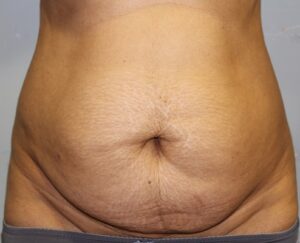
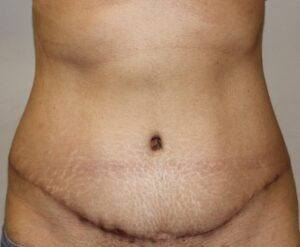
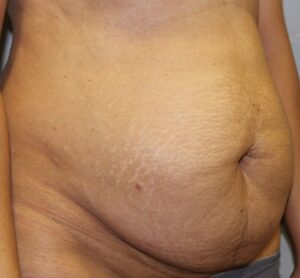
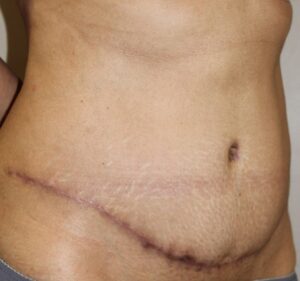
What To Expect After Abdominoplasty Surgery in Manchester
You will usually return to the ward within an hour following an abdominoplasty in Manchester and you will be encouraged to mobilise. You will not have a catheter in place and it is unusual to require surgical drains. You will be able to eat, drink and mobilise as soon as the anaesthetic subsides.There will be some abdominal swelling after the surgery, which analgesia can help with any discomfort. You will be able to go home the next day and should keep the incision areas dry for the next week. You should arrange for a friend or family member to collect you after the surgery and have some support at home for the next week.
A week after the surgery, Gary Ross will assess the tummy tuck in the Manchester clinic to make sure the recovery is going well. A support garment will be worn for around 4 to 6 weeks and it’s essential that you rest and avoid any strenuous activities. You will be able to resume light exercises after a week and normal exercise by 4-6 weeks. You should also begin massaging the scar area once it’s healed, this will improve the circulation and help the scar fade more naturally. As mentioned earlier, all procedures are unique to the patient and while this advice is the case for most people, speaking to your surgeon about exercise and other changes is advised.
Risks and Complications of Tummy Tuck Surgery
The vast majority of patients are delighted with the results of their abdominoplasty surgery in Manchester. But common complaints include numbness, bruising, swelling especially around the scar line and often there is a slight difference between the two sides of the stomach.
Uncommon abdominoplasty risks and complications include infection, haematoma, delayed healing/skin necrosis/skin loss, seroma formation and thickened abdominoplasty scar. Around 4-6 weeks it is relatively common to have a little discharge from dissolving stitches (see image) and this will resolve (see image). There are uncommon risks of general anaesthesia such as respiratory/cardiac compromise and deep vein thrombosis.
Sensation usually changes following a full abdominoplasty. Although permanent numbness is uncommon, sensation can take a number of months to return. The scars following abdominoplasty can be red for a number of weeks/months after surgery and it can take some time before the scars start turning purple/pink and then start fading into a white line. It is unusual to develop abnormal scars and irregularities requiring scar revision. Any revisions to the scars should not be considered for at least a year following your tummy tuck surgery in Manchester. The scar is often not symmetrical and the scar can move slightly with time. The abdomen can become lax with time and the result can change with fluctuations in weight. Dog ears occasionally occur at the end of the scar as can be seen from the long term photo showing a dog ear on the left side.
Urological, bowel and sexual function may be altered in the immediate postoperative period. It is very uncommon for any long-term functional problems to occur. If you ever have any postoperative concerns, contact your abdominoplasty surgeon as soon as possible.
Why Choose Gary Ross MBChB, MD, FRCS, (Plast) For Your Tummy Tuck in Manchester?
Gary Ross is a full member of the British Association of Plastic, Reconstructive and Aesthetic Surgeons (BAPRAS); British Association of Aesthetic Plastic Surgeons (BAAPS), American Society of Plastic Surgeons (ASPS), Association of Breast Surgeons (ABS), British Association of Head and Neck Oncologists (BAHNO) and is a fully accredited plastic surgeon on the General Medical Council’s specialist register for plastic surgery. Gary Ross is a highly experienced Abdominoplasty surgeon in Manchester, so you will be in the safest environment possible for your procedure. You can review more abdominoplasty before and after images and discuss your specific treatment options with Gary Ross.
A A full tummy tuck is a surgery that rejuvenates the entire abdominal area, helping to improve the overall contour of the abdomen. This differs from mini tummy tuck, surgery, which is solely focused on the lower abdomen. The recovery time is similar for both of the procedures. When it comes to deciding whether a mini tummy tuck or full abdominoplasty is right for you, it will depend on your expectations for the outcome. During a consultation, an abdominoplasty surgeon will discuss your suitability for each procedure, explain the benefits and risks and then advise on the best treatment for you.
Whilst full abdominoplasty surgery focuses on removing excess skin or fat from the entire abdomen, a reverse tummy tuck is solely focused on removing excess skin and fat from the upper abdomen. The incision is made in the lower breast fold and also sometimes in the lower sternum, so the scars are barely visible, even in bikinis. With this procedure, it is also possible to reconnect the rectal muscle alongside removing the fat and excess skin. As with the other types of abdominoplasty, your tummy tuck surgeon in Manchester will be able to advise on whether a reverse tummy tuck is right for you. .
After full abdominoplasty surgery in Manchester, full recovery will take around 6 weeks. After the procedure, your tummy tuck surgeon will advise that you mobilise as soon as possible after the anaesthetic has worn off. It is normal to feel discomfort, but you will usually be able to go home the next day and will be asked to keep the wound dry for a week. You will be asked to visit your abdominoplasty surgeon to make sure that you are recovering as you should be. For 4-6 weeks after surgery, you will only be able to do light exercise such as walking. After this, once approved by your tummy tuck surgeon, you will be able to resume normal exercise at around the 6 week period. Massaging the scar once fully healed is advised to minimise scarring.
